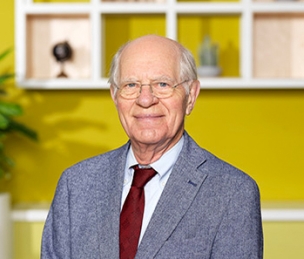Displaying 1 - 9 of 9
-
Levelt, W. J. M. (2020). On becoming a physicist of mind. Annual Review of Linguistics, 6(1), 1-23. doi:10.1146/annurev-linguistics-011619-030256.
Abstract
In 1976, the German Max Planck Society established a new research enterprise in psycholinguistics, which became the Max Planck Institute for Psycholinguistics in Nijmegen, the Netherlands. I was fortunate enough to be invited to direct this institute. It enabled me, with my background in visual and auditory psychophysics and the theory of formal grammars and automata, to develop a long-term chronometric endeavor to dissect the process of speaking. It led, among other work, to my book Speaking (1989) and to my research team's article in Brain and Behavioral Sciences “A Theory of Lexical Access in Speech Production” (1999). When I later became president of the Royal Netherlands Academy of Arts and Sciences, I helped initiate the Women for Science research project of the Inter Academy Council, a project chaired by my physicist sister at the National Institute of Standards and Technology. As an emeritus I published a comprehensive History of Psycholinguistics (2013). As will become clear, many people inspired and joined me in these undertakings. -
Levelt, W. J. M. (2020). The alpha and omega of Jerome Bruner's contributions to the Max Planck Institute for Psycholinguistics. In M. E. Poulsen (
Ed. ), The Jerome Bruner Library: From New York to Nijmegen (pp. 11-18). Nijmegen: Max Planck Institute for Psycholinguistics.Abstract
Presentation of the official opening of the Jerome Bruner Library, January 8th, 2020Additional information
Link to booklet - The Jerome Bruner Library: From New York to Nijmegen -
Ehrich, V., & Levelt, W. J. M. (
Eds. ). (1982). Max-Planck-Institute for Psycholinguistics: Annual Report Nr.3 1982. Nijmegen: MPI for Psycholinguistics. -
Levelt, W. J. M. (1982). Cognitive styles in the use of spatial direction terms. In R. Jarvella, & W. Klein (
Eds. ), Speech, place, and action: Studies in deixis and related topics (pp. 251-268). Chichester: Wiley. -
Levelt, W. J. M. (1982). Het lineariseringsprobleem van de spreker. Tijdschrift voor Taal- en Tekstwetenschap (TTT), 2(1), 1-15.
-
Levelt, W. J. M. (1982). Linearization in describing spatial networks. In S. Peters, & E. Saarinen (
Eds. ), Processes, beliefs, and questions (pp. 199-220). Dordrecht - Holland: D. Reidel.Abstract
The topic of this paper is the way in which speakers order information in discourse. I will refer to this issue with the term "linearization", and will begin with two types of general remarks. The first one concerns the scope and relevance of the problem with reference to some existing literature. The second set of general remarks will be about the place of linearization in a theory of the speaker. The following, and main part of this paper, will be a summary report of research of linearization in a limited, but well-defined domain of discourse, namely the description of spatial networks. -
Levelt, W. J. M., & Kelter, S. (1982). Surface form and memory in question answering. Cognitive Psychology, 14, 78-106. doi:10.1016/0010-0285(82)90005-6.
Abstract
Speakers tend to repeat materials from previous talk. This tendency is experimentally established and manipulated in various question-answering situations. It is shown that a question's surface form can affect the format of the answer given, even if this form has little semantic or conversational consequence, as in the pair Q: (At) what time do you close. A: “(At)five o'clock.” Answerers tend to match the utterance to the prepositional (nonprepositional) form of the question. This “correspondence effect” may diminish or disappear when, following the question, additional verbal material is presented to the answerer. The experiments show that neither the articulatory buffer nor long-term memory is normally involved in this retention of recent speech. Retaining recent speech in working memory may fulfill a variety of functions for speaker and listener, among them the correct production and interpretation of surface anaphora. Reusing recent materials may, moreover, be more economical than regenerating speech anew from a semantic base, and thus contribute to fluency. But the realization of this strategy requires a production system in which linguistic formulation can take place relatively independent of, and parallel to, conceptual planning. -
Levelt, W. J. M. (1982). Science policy: Three recent idols, and a goddess. IPO Annual Progress Report, 17, 32-35.
-
Levelt, W. J. M. (1982). Zelfcorrecties in het spreekproces. KNAW: Mededelingen van de afdeling letterkunde, nieuwe reeks, 45(8), 215-228.

Share this page